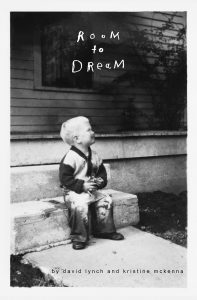Shehryar Fazli in the Los Angeles Review of Books:
 CRITICS GENERALLY DEFINE “Lynchian” as the cohabitation of the macabre and the mundane. The severed ear hidden in the field in Blue Velvet may be the most iconic representation of this junction, but it’s everywhere in David Lynch’s work: from Twin Peaks’s sweet, brochure-like title sequence of a mountainous town that, as it turns out, hides Laura Palmer’s corpse and many other monstrosities, to the arrival of Naomi Watts’s aspiring actress Betty in a dreamlike Hollywood in Mulholland Drive, before the nightmare of that city consumes her. In Lynch’s early work, the small town is the theater of this dance of innocence and evil, but in his later films, namely the loose trilogy of Lost Highway (1997), Mulholland Drive (2001), and Inland Empire (2006), the macabre and the mundane coexist in the individual soul. Upon reading Room to Dream — Lynch’s newly released experimental memoir — one’s tempted to say that the same coupling exists in David Lynch himself.
CRITICS GENERALLY DEFINE “Lynchian” as the cohabitation of the macabre and the mundane. The severed ear hidden in the field in Blue Velvet may be the most iconic representation of this junction, but it’s everywhere in David Lynch’s work: from Twin Peaks’s sweet, brochure-like title sequence of a mountainous town that, as it turns out, hides Laura Palmer’s corpse and many other monstrosities, to the arrival of Naomi Watts’s aspiring actress Betty in a dreamlike Hollywood in Mulholland Drive, before the nightmare of that city consumes her. In Lynch’s early work, the small town is the theater of this dance of innocence and evil, but in his later films, namely the loose trilogy of Lost Highway (1997), Mulholland Drive (2001), and Inland Empire (2006), the macabre and the mundane coexist in the individual soul. Upon reading Room to Dream — Lynch’s newly released experimental memoir — one’s tempted to say that the same coupling exists in David Lynch himself.
More here.
